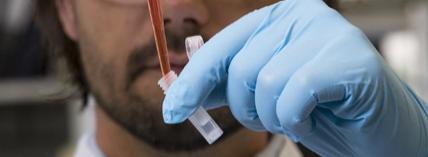Studying ... Chemistry?
Christians in Science have produced a series of leaflets giving an insight into what it can mean to study and work in various sciences as a Christian. Inevitably, they take a particular perspective on some issues on which Christians disagree. Whatever your own view on these topics, we believe you will find helpful insights if you are studying the subject or considering a career in this area.
Studying Chemistry as a Christian
Chemistry seeks to model, understand, tailor and make use of everything in the natural world, from the atomic building blocks of matter to the complex metabolic pathways of living organisms. It is a fascinating subject which has the potential to impact the world in which we live for either good or ill.
As Christians in chemistry, the interaction of our complementary scientific and Christian worldviews is vitally important, allowing us to grow in our own faith and enabling us to be effective contributors, participants and witnesses in our classes and laboratories. This leaflet provides an introduction to some challenges associated with being a Christian chemist and highlights some positive aspects of studying chemistry as a Christian.
Chemistry as a Calling
A chance to make a difference...
Christians have long been at the forefront of the development of modern chemistry. Robert Boyle (17th century, often described as the Father of Modern Chemistry), Michael Faraday (19th century, set out the first laws of electrochemistry) and Charles Coulson (20th century, instrumental in the development of valence theory) are just three well-known and influential chemists who were also committed Christians and saw their scientific work as an act of worship.
One of the most exciting things about studying chemistry as a Christian is the potential to make a real difference to people’s lives. Future challenges facing mankind include the development of new environmentally friendly energy supplies, tackling climate change, discovering new drugs to fight disease, feeding the huge global population, delivering clean drinking water and creating sustainable materials; each one of these challenges requires input from those with a knowledge of chemistry. As Christians, we are to love our neighbour. With challenges like these facing us in the future, chemistry is certainly a subject in which we can use our scientific gifting to serve others.
A chance to explore creation…
Romans 1:20 tells us “For ever since the world was created, people have seen the earth and sky. Through everything God made, they can clearly see his invisible qualities – his eternal power and divine nature.”
Chemistry is a subject full of awe and wonder
The world at a molecular level can be a deeply counter-intuitive place and in studying chemistry we discover a whole new realm of creation with laws very different from the Newtonian world of solid objects which we would otherwise encounter. Nature is an inspiring teacher and even the simplest living organism can undertake far more sophisticated and efficient reactions than the most accomplished chemist. Chemistry is a subject full of awe and wonder, and learning more of the chemical world can really enhance our worship of the Creator.
A chance to wear a white coat … or not …
Being a chemist can be just as much a Christian calling as being a medical doctor, a teacher or an ordained minister. Chemistry can take you far beyond the walls of the lab, from the UK’s Antarctic base studying ozone depletion, to the Brazilian Rainforest researching nature-derived pharmaceuticals.
Closer to home, health care, research institutions, energy and defence firms are some of the largest employers of chemists – all important sectors in our society and all with substantial ethical dimensions where Christian voices are needed. The diverse range of problems addressed by chemistry offers opportunities, not only for an exciting career, but also for Christians to impact how research is done, how funding is allocated and how important decisions are made.
Chemistry and Christianity – Common Challenges
Facts versus dogma...?
Scientific knowledge is often portrayed as being based on hard facts, whereas religious belief is caricatured as irrational and based on unfounded opinions. In fact, science and theology have much in common for they both comprise models for describing reality.
science and theology both comprise models for describing reality
Science is not a series of brute facts, but is a human endeavour that seeks to make sense of the world using hypotheses, models and theories. It is also a set of evolving disciplines, with our understanding of nature and the range of observable phenomena changing over time.
We often talk about ‘scientific facts’ but this means very different things in different academic disciplines; for instance, what is considered evidence by an evolutionary psychologist is very far removed from the sort of ‘proof’ that would be accepted by a particle physicist. Looking at chemistry, the most complete mathematical description we have at the atomic level is quantum mechanics, but even that can only be used to exactly describe the structure of atoms or ions with one electron; all other systems are described only approximately. Chemistry includes many such hypotheses and models, most of which are accepted not because we think that is the way things actually are, but because they are useful for helping us understand and predict how materials behave. Curly arrows, oxidation states, ball and stick diagrams, molecular bonding ... all of these are really useful, but are simplifications of a more complex underlying reality.
The nature of Christian faith is also often misunderstood. Some think that faith is a series of unquestionable assertions, completely detached from the world in which we live, but in reality, Christian faith is based on reason, evidence and experience. At the centre of Christianity is the life, death and resurrection of Jesus Christ. Obviously we can’t put Jesus in a test-tube to see how he responds under carefully controlled conditions and then write an equation that tells us who he is. But Jesus is a historical figure and we can discover who he is by investigating for ourselves his life, death and claims, to see whether this tallies with our own experiences of him and of the world.
science and Christian theology are both tools which we use to search for truth
We also need to be aware of the limitations of both science and theology. Why there is something rather than nothing, whether something is morally right or wrong, whether there is a purpose to life ... these are not scientific questions and they cannot be answered by the methods of science; that does not mean they are not important questions, nor does it mean that they cannot be answered – we just need to look elsewhere. In the same way, theology as a discipline is not concerned with questions of mechanism (how this or that works), but rather with questions of meaning; Galileo is often quoted as having said “the Bible teaches us how to go to heaven, not how the heavens go.”[1]
At their heart, science and Christian theology both seek to develop the best model of the world around us using all available evidence; both disciplines are tools which we use to search for truth.
Origins…
The question of how the universe came to be as it is and how we as humans came about often resonates deeply, particularly with scientists. Many conversations between scientist Christians and other scientists about God and Christ end up considering biological evolution or the Big Bang.
Chemistry’s contribution to the story of our origins – the transformation of inanimate matter into the first living organisms – is much less well understood than other areas of our origins. However, many parts of the process are increasingly understood and we may eventually know the molecular details of the origin of life. As Christians we need to think through how we would respond to a developed theory in this area.
a ‘god of the gaps’ model can never be sufficient for a practising Christian chemist
We must realise that if God is the creator of the entire universe, it is not valid to limit his role in creation only to the areas that we do not understand. As scientists we will always seek to fill gaps in our knowledge with new hypotheses, experiments and theories and so a ‘god of the gaps’ model can never be sufficient for a practising Christian chemist.
God of the gaps can be an attractive model for atheists or agnostics, who deduce that God is unnecessary, or at best diminished, as our scientific understanding progresses. But as Christians we know that explaining something by science does not mean we explain away the need for God; our view of God must be much bigger than god of the gaps. We see evidence of God’s involvement throughout creation, both in the areas we can explain through science, and in those we cannot.
In thinking about evolution, Charles Kingsley summed up an alternative position to god of the gaps, which applies just as much to a chemical theory for the origin of life as it does to evolution: “We knew of old that God was so wise that He could make all things; but behold, He is so much wiser than even that, that He can make all things make themselves”.[2]
Life in the Lab…
Christianity is for daily living, not just for Sunday, Christian Union meetings and the like. As in all areas of life, how you live out your Christian faith matters and has the potential to provide a powerful witness to those around you. Chemistry is an enormously sociable subject and you are likely to spend long hours working alongside other students and researchers, in lectures, practical labs, workshops and seminars. Being salt and light in these different areas, we may well encounter a number of challenges including:
- Maintaining our integrity – Temptations for Christians in the lab can include being creative in reporting our results, presenting a biased picture of our work and incorporating other people’s work without due credit, especially when others around us are erring in these areas. We have to be careful to maintain our Christian integrity in a competitive and sometimes cut-throat field.
- Keeping things in perspective – As scientists, we often set ourselves very high standards and our work can often impinge on our personal lives. We need to keep our work in perspective, making sure that it only ever comes in third place after God and family.
- Choosing which areas to work in – Fritz Haber was awarded the Nobel prize for developing the Haber process (ammonia production) in order to produce fertilizer, without which the current world population would be unsustainable. He is also known as the father of chemical warfare for his work developing and deploying chlorine and other poisonous gases during World War I. We need to be sure that our scientific gifts are used in a way which is consistent with loving God and loving our neighbour.
There is great scope for exploring the interaction of Christianity and chemical science, which both seek to understand how the created world works and how that knowledge can be used for the benefit of all.
References
[1] Letter to Grand Duchess Christina of Tuscany, 1615.
[2] The Natural Theology of the Future, a lecture given at Sion College, January 10th, 1871.
Further Information
Articles:
The Faraday Papers (www.faraday.st-edmunds.cam.ac.uk/Papers.php). Various papers by several authors on different aspects of the science-faith discussion.
Kolstoe, S., Moore, H., 'Being a Christian in Research' (2012). Another leaflet in this series: www.cis.org.uk/resources/articles-talks-and-links/students/.
Books:
Alexander, D, Creation or Evolution: do we have to choose? (2008) ISBN: 978-1854247469
Peacocke, A., Paths from Science Towards God: the end of all our exploring (2001) ISBN: 978-1851682454
Polkinghorne, J., Science and Theology: an introduction (1998) ISBN: 978-0800631536
Wilkinson, D., The Message of Creation (2002) ISBN: 978-0851112695
Useful Websites:
Christians in Science: www.cis.org.uk
ASA, CiS’s US sister organisation: www.asa3.org
The Faraday Institute: www.faraday-institute.org
Test of Faith: www.testoffaith.com
Royal Society of Chemistry: www.rsc.org
© 2013 Christians in Science



